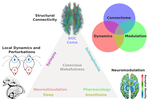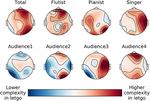Altered states of consciousness
Imagine a computer, made of transistors. These transistors, much like our neurons, go ‘click’ in very precisely calculated ways. Next, we sprinkle a few micrograms of an alien substance, one the transistors have never encountered before. Now we turn on the computer – and, miraculously, instead of setting on fire, the computer produces a fast stream of sounds, images, and text it has never produced before. As incredible as this seems, this is in fact what happens to the brain under the effects of psychedelic drugs like LSD. The effect of literally a handful of molecules per neuron makes the owner of such a brain smell sounds, hear lights, and feel a profoundly different kind of consciousness.
How does the brain, in response to stimuli so far detached from its evolutionary history, generate these experience that differ so radically from our normal state of awareness? And what can we learn about “non-altered” consciousness from these disruptions?
While I am particularly interested in altered states induced by psychedelic drugs, I have also investigated states of musical flow and others. I believe altered states in general constitute an incredibly rich ground for consciousness research, and should be investigated with the scientific rigour they deserve.




